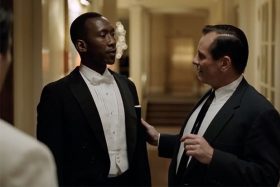
In 2016, Andrew Garfield starred in—and was nominated for Best Actor for—a movie called Hacksaw Ridge. It told the little-known story of Army medic Desmond Doss, who fought in some of the most brutal battles of World War II while refusing to carry or fire a gun. That same year, there was another film called Hidden Figures, which told the true story of the team of female African-American mathematicians at NASA, whose contributions to the space program were unheralded for so many decades, even though, without them, America most likely would never have stepped foot on the moon, let alone even flown successfully into space.
another film called Hidden Figures, which told the true story of the team of female African-American mathematicians at NASA, whose contributions to the space program were unheralded for so many decades, even though, without them, America most likely would never have stepped foot on the moon, let alone even flown successfully into space.
I’ll tell you, those two movies really blew me away. Neither of them were great movies, in the realm of cinematic achievement, but what they were was fascinating. They told true stories that were practically unknown to the vast majority of Americans, and, like the true story that was told in 12 Years a Slave, the stories that are both true and interesting are sometimes the best kind of movie. Truth is, after all, much stranger — and more interesting — than fiction.
Which is why I was both excited and ultimately disappointed by director Peter Farrelly’s new movie, Green Book. Like Hacksaw Ridge, Hidden Figures and 12 Years a Slave, Green Book tells the story of a piece of American history that most people don’t know about, one that is interesting and rife with cinematic possibilities. Green Book gets its title from a publication that existed in America during the Jim Crow era called “The Negro Motorist Green Book,” which was essentially a guide to how to travel while black in America. It offered suggestions and guidance about which restaurants and hotels would actually serve black guests. I had no idea such a thing even existed, I am embarrassed to say, which is why Green Book is an important movie to see.
Directed by Peter Farrelly and starring Viggo Mortensen and Mahershala Ali, Green Book is based on the true story of a friendship that forms between black pianist Don Shirley (Ali) and his white driver, Tony Vallelonga (Mortensen—who gained 45 pounds for the role), as they travel through the Deep South on a concert tour in 1962. Don is a sheltered and uptight musician with few social skills and Tony is a hot-headed Italian bouncer from the Bronx. Classic oil and water. Bet you’ve never seen THAT before. Add to the personality conflicts the fact that one is white and one is black and they are driving through the Deep South, and you’ve got Driving Miss Daisy on steroids.
And here’s the thing: I was expecting Green Book to be just like Driving Miss Daisy. I hated the trailer, it made the movie look so predictable and unoriginal, it made me NOT want to see it. Both actors (who I adore) looked like they were overacting and the whole thing looked awful. I’m so happy to say that the movie is not nearly as bad as the trailer. Although it is very predictable and clichéd in a lot of places, overall the movie manages to avoid so many of the pitfalls I expected it to fall into. Contrary to the impressions of the trailer, neither actor is over the top, in fact both are quite stellar, and the experience of the movie as a whole is like drinking a vanilla milkshake: smooth, enjoyable, but quite ordinary.
And maybe that’s what ultimately bothered me about the movie. It tells a pretty safe story about a friendship, focuses most of its energy on revealing the characters and how they relate to and change each other. The racial conflicts in the story, however—including the existence of the Green Book itself—are portrayed in ways that are eye-rollingly familiar. The erstwhile racist Italian bouncer sees racism up close and only after he has gotten to know his black friend does he stand up to it. If I never see another movie again with this setup, it will be too soon. I understand that the point of it is to see Tony become more aware and accepting, but do we really need that? I cared much more about the relationship between the two and, quite frankly, about the existence of that book and what it meant —and the restrictions it placed—for black people who were trying to travel around this country. Instead, we have familiar scenes of blatant racism, seemingly inserted to elicit a response from the audience, which, to be honest, just felt lazy.
Overall, Green Book is certainly a movie that is easy to watch and will not shock or dismay you. There’s nothing here you haven’t seen before, but the performances make that tolerable. If, however, you are expecting a deep dive into the logistics of racism, i.e. a historical perspective on the need for such a thing as a guide to where a black person would be welcome in America, you won’t get that from this movie. The most profound thing you’ll get from Green Book is the realization that a fat Viggo Mortensen is just as perplexing as it is wrong.
